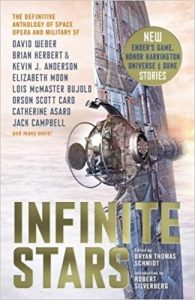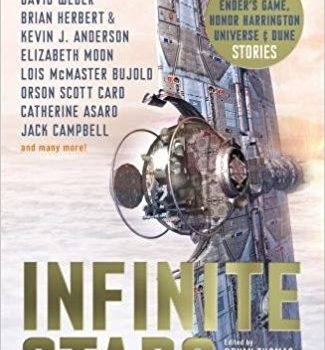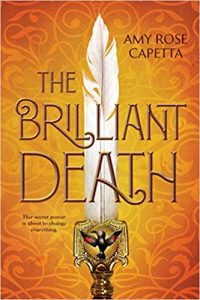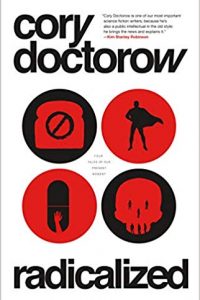Rich Horton reviews Infinite Stars by Bryan Thomas Schmidt, ed.
Infinite Stars, Bryan Thomas Schmidt, ed. (Titan 9781785655937, $24.95, 688pp, hc) October 2017.
 Bryan Thomas Schmidt’s new anthology Infinite Stars is a big collection of space opera stories, split roughly evenly between reprints and originals. The reprints serve to some extent as an introduction to the subgenre, with examples from such classic series as Cordwainer Smith’s Instrumentality of Mankind, Anne McCaffrey’s Ship Who Sang books, Lois McMaster Bujold’s Vorkosigan series, A.C. Crispin’s Starbridge, and Larry Niven & Jerry Pournelle’s Codominium. In addition there are a couple of standalone reprints by major authors (Poul Anderson’s “Duel on Syrtis” and Robert Silverberg’s “The Iron Star”), and one major, very recent reprint, Nnedi Okorafor’s Hugo winning novella “Binti” (which itself is becoming a series). Rounding out the reprints is a collaboration between two of the earliest and greatest authors of space opera, Leigh Brackett & Edmond Hamilton, their posthumously published mashup of their two separate series: “Stark and the Star Kings”.
Bryan Thomas Schmidt’s new anthology Infinite Stars is a big collection of space opera stories, split roughly evenly between reprints and originals. The reprints serve to some extent as an introduction to the subgenre, with examples from such classic series as Cordwainer Smith’s Instrumentality of Mankind, Anne McCaffrey’s Ship Who Sang books, Lois McMaster Bujold’s Vorkosigan series, A.C. Crispin’s Starbridge, and Larry Niven & Jerry Pournelle’s Codominium. In addition there are a couple of standalone reprints by major authors (Poul Anderson’s “Duel on Syrtis” and Robert Silverberg’s “The Iron Star”), and one major, very recent reprint, Nnedi Okorafor’s Hugo winning novella “Binti” (which itself is becoming a series). Rounding out the reprints is a collaboration between two of the earliest and greatest authors of space opera, Leigh Brackett & Edmond Hamilton, their posthumously published mashup of their two separate series: “Stark and the Star Kings”.
These serve their purpose very well – they are a set of significant stories and showcase space opera from the ’50s to the present day nicely. Curiously, in that I generally think the subgenre works best at greater lengths (the late, great Brian W. Aldiss talked of the “wide screen baroque” feel of space opera, and “wide screen” at least seems to call for, if you will, “wide books”), the two best of these reprints might be the shortest: Cordwainer Smith’s “The Game of Rat and Dragon” and Poul Anderson’s “Duel on Syrtis”. This may be partly because both stories are self-contained (though there is a sequel of sorts to “Duel on Syrtis”, “War-Maid of Mars”). If I confess that I don’t like “The Ship Who Sang” all that much, or that I think “Stark and the Star Kings” is a less than successful, and rather contrived, marriage of Brackett’s Eric John Stark and Hamilton’s Star Kings universes, I still concede that they represent important parts of our field’s history. (In the interest of full disclosure, I will add that Schmidt discussed the project with me (and several others) and asked for recommendations for possible reprints.)
As I hint above, lots of space opera is best appreciated in big novels, or indeed in extended series. And most of the other stories in this book are also parts of series. Sometimes this hampers them a bit – they can seem either incomplete, or a bit overdetermined, or just kind-of marking time. A lot seem almost designed as teasers for the full series they represent. These series include some really major SF landmarks: Orson Scott Card’s Ender universe, Brian Herbert & Kevin J. Anderson continuing Frank Herbert’s Dune series, David Weber’s Honorverse. There are stories from some more recent series that I’ve really enjoyed – Elizabeth Moon’s Vatta’s War, for example (which she has just returned to), and David Drake’s Leary/Mundy (or RCN) series. It was nice also to be introduced to some work new to me, such as Linda Nagata’s Red stories, Jack Campbell’s Lost Fleet, and Charles R. Gannon’s Caine Riardon stories.
Which, then, of the original stories are best? Two in a row feature space navy members going on shore leave: “Cadet Cruise” by David Drake and “Shore Patrol” by Jack Campbell. That allows for a self-contained event space with plenty of potential for action. In both cases, the stories show eventual series heroes early in their career dealing with the foggy ethical/legal/moral situations regarding shore leave from the POV of a non-local navy. In each case (and in very different ways) our heroes navigate this space successfully, and in a way that illuminated their developing characters. Jean Johnson’s “How to be a Barbarian in the Late 25th Century” amusingly views Mitch Turman’s struggle writing an Action Report about his Platoon’s latest adventure on a colony world. Turman would rather write it up as if it was a pulp adventure story about a team of barbarians battling fantastical beasts – and it works quite well that way, even if regulations require something much drier. The best of all the new stories is Alastair Reynolds’ “Night Passage”, a dark story about what goes wrong when a spaceship carrying both the hivemind-like Conjoiners and the more conventionally “human” Demarchists breaks down in mid-journey to the planet Yellowstone, coincidentally close to a significant alien artefact. The Conjoiners are suspected of sabotage or mutiny, and war threatens. The Captain is also forced to make a morally fraught decision affecting the fate of the entire set of crew and passengers, if there is going to be any continuance of the mission. It’s unsettling and effective work.
Taken all in all, Infinite Stars is a strong celebration of the variety and power of the space opera subgenre, both in its history and its ongoing vitality.
Rich Horton works for a major aerospace company in St. Louis, MO. He has published over a dozen anthologies, including the yearly series The Year’s Best Science Fiction and Fantasy from Prime Books, and he is the Reprint Editor for Lightspeed Magazine. He contributes articles and reviews on SF and SF history to numerous publications.
This review and more like it in the October 2017 issue of Locus.







